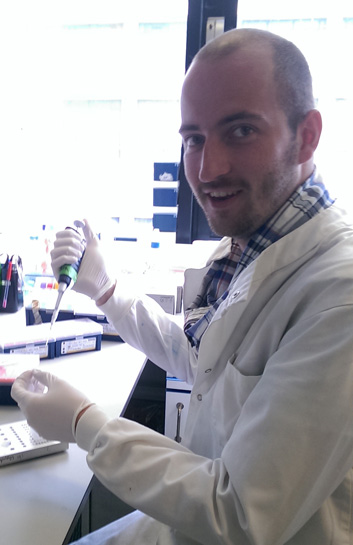
Maurice Overzier, Netherlands
Research Technician, LUMC, Leiden, the Netherlands
From June 16th till June 20th I have visited the lab of Dr. Bernard Khoo (University College London, Division of Medicine to work with Dr. Petra Disterer at the Institute of Liver and Digestive Health.
The project I am working on focuses on developing antisense-mediated exon skipping using antisense oligonucleotides (AONs) as a potential therapy to treat the hereditary syndrome CADASIL. In CADASIL, mutations in the NOTCH3 gene result in a misfolding of the NOTCH3 protein, which causes toxic NOTCH3 accumulation in the vasculature. Skipping of exons 4 and 5 (which would target the majority of CADASIL-causing mutations) of the NOTCH3 gene may be a strategy to reduce toxic NOTCH3 accumulation. Quantification of exon skipping is desired for determining the efficiency of the AONs.
The efficiency of NOTCH3 exon skipping is determined by quantitative PCR (qPCR). With qPCR primers, designed for two different quantification methods, we were able to detect downregulation of the full length NOTCH3 and formation of exon 4-5 skipped NOTCH3 transcripts, but the primers did not work. I was offered to visit the lab of Petra Disterer in London where I was taught the ins and outs of qPCR setup, primer design and analysis.
During my 5-day stay I have learnt how to set up a qPCR in general, using our NOTCH3 constructs and in vitro samples as examples and how best to interpret these results. Specially, several useful methods on how to design qPCR primers for both downregulation and detecting skipped product were discussed.
In conclusion I can state that this short term scientific mission has resulted in us gaining precious information that can and will be used for future experimental setups and analyses within the LUMC. Useful tips regarding sample preparation, qPCR normalisation and validation will be implemented in our analyses in the future.
In the end I can say that a productive and fruitful collaboration with the host was achieved.
June 2014
